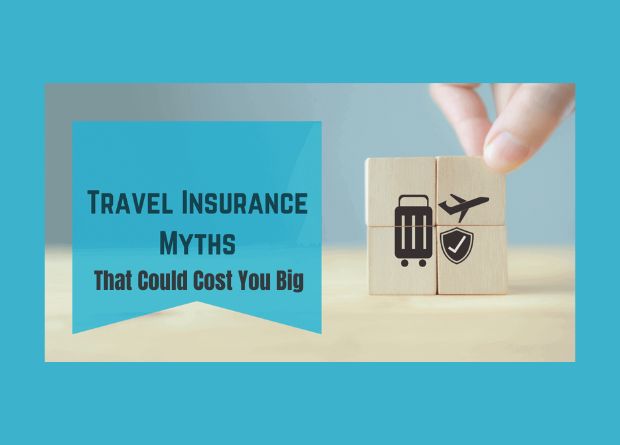Travel insurance is one of those things people often overlook—or misunderstand—when planning a trip. Many travelers assume it’s an unnecessary add-on or believe that nothing could possibly go wrong. But the truth is, unexpected events like canceled flights, medical emergencies, or lost baggage can quickly turn a dream vacation into a financial nightmare.
What makes it worse is that several common myths about travel insurance stop people from making informed decisions. In this article, we’re busting some of the most dangerous travel insurance myths—because believing them could cost you much more than just peace of mind.
Myth #1: “I’m Healthy, So I Don’t Need Travel Insurance”
Even the healthiest person can get injured or fall ill while abroad. From food poisoning to a twisted ankle on a hike, health issues can strike at any time. Without insurance, medical treatment in another country can be expensive—or worse, denied until you pay upfront.
👉 In the U.S., a hospital visit can cost thousands of dollars. Even in countries with lower medical costs, private clinics often charge foreign tourists at premium rates.
External Link: Centers for Disease Control: Traveler’s Health
Myth #2: “My Credit Card Has Travel Protection—That’s Enough”
While it’s true that many premium credit cards offer some travel protection, the coverage is often limited to trip cancellation or rental car insurance. They typically don’t include comprehensive medical coverage, evacuation services, or extended delays.
Always read the fine print on your card benefits. You might still need standalone travel insurance for full coverage.
External Link: NerdWallet Guide to Travel Insurance and Credit Cards
Myth #3: “It Only Covers Big, Expensive Trips”
Whether you’re going on a luxury cruise or a budget backpacking trip, things can go wrong. Even a short domestic trip can involve flight delays, bad weather, or lost luggage. Travel insurance is about protecting your financial investment and health, no matter the price tag of the trip.
In fact, policies are often affordable and customizable—even for weekend getaways.
Myth #4: “I Can Buy Insurance After Something Goes Wrong”
Insurance only covers unforeseen events. Once you know about a potential disruption (like a storm approaching your travel dates or a medical diagnosis), it’s too late to buy coverage for that event. That’s why it’s best to buy travel insurance as soon as you book your trip.
Some policies even offer pre-existing condition waivers, but only if purchased within a set window (typically 14–21 days after your initial trip deposit).
External Link: Squaremouth: When to Buy Travel Insurance
Myth #5: “It’s Too Expensive”
Travel insurance typically costs 4% to 10% of your total trip cost. For example, if your trip costs $2,000, insurance might be as little as $80–$200. When you consider the potential costs of trip cancellations, emergency evacuations, or lost belongings, it’s a small price for big protection.
You can also tailor plans to your needs—medical-only, trip-cancellation-only, or all-inclusive coverage.
External Link: TravelInsurance.com Cost Estimator
Myth #6: “It Covers Everything Automatically”
Not all policies are equal. Many travelers assume they’re covered for every possible situation, but there are exclusions—especially for:
-
Adventure sports (e.g., scuba diving, skiing)
-
Pre-existing medical conditions
-
COVID-19 disruptions (varies by provider)
-
High-value electronics without added coverage
Tip: Always read the Coverage Summary and Policy Certificate before buying. Make sure your activities and health needs are covered.
Myth #7: “I Don’t Need It for Domestic Travel”
Even if you’re traveling within your own country, travel insurance can help. It may cover hotel cancellations, flight delays, lost baggage, and even emergency transportation if you’re far from home.
For example, someone in Tanzania traveling from Dar es Salaam to Arusha by air might still face delays or cancellations that cost time and money.
Myth #8: “Filing a Claim Is Too Difficult”
Many insurance companies now offer online claims portals, mobile apps, and even 24/7 customer service to make filing a claim easier. As long as you provide accurate documentation—like receipts, police reports, or medical records—the process is usually straightforward.
External Link: Allianz Travel Insurance Claim Portal
Myth #9: “It’s Only Useful if I Cancel My Trip”
Trip cancellation is just one part of travel insurance. The best policies offer:
-
Trip interruption coverage (if you need to cut your trip short)
-
Baggage delay/loss
-
Medical expenses
-
Emergency evacuation
-
Travel delay reimbursement
You might never cancel—but other mishaps can cost you even more.
Myth #10: “I Can Just Rely on My Government or Embassy Abroad”
Embassies can help with documentation, but they do not pay your medical bills or evacuate you. During emergencies, you’ll be on your own financially unless you have proper coverage.
Even during global crises or natural disasters, consular help may be limited and slow.
External Link: U.S. State Department Travel Insurance Advice
Also Check:
- Millennials Life Insurance: Planning Ahead in Your 20s and 30s
- Understanding natural disaster insurance: Are You Covered?
- Cyber Insurance: Protecting Your Digital Assets in the Modern Age
- Pet Insurance Demystified: Is It Worth the Investment?
- Navigating Insurance for Freelancers: Essential Coverage Tips
Final Thoughts
Travel insurance isn’t just for the paranoid—it’s for the prepared. By understanding what it does (and doesn’t) cover, you can protect yourself from costly surprises. Whether you’re exploring locally or traveling internationally, a small upfront investment in the right policy could save you a fortune and offer much-needed peace of mind.
Next time you plan a trip, don’t fall for the myths. Take a few minutes to research, compare, and choose the travel insurance that truly meets your needs.
